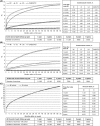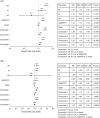Cardiovascular events and death after myocardial infarction or ischemic stroke in an older Medicare population
- PMID: 30697776
- PMCID: PMC6712383
- DOI: 10.1002/clc.23160
Cardiovascular events and death after myocardial infarction or ischemic stroke in an older Medicare population
Abstract
Background: Survivors of myocardial infarction (MI) or ischemic stroke (IS) are at high risk for subsequent cardiovascular events.
Hypothesis: Older patients with prior MI or IS are at risk for recurrent cardiovascular events, and comorbidities such as diabetes may increase this risk.
Methods: Two cohorts were studied in a retrospective Medicare 20% random sample-a 2008 cohort with up to 6 years of follow-up (MI, N = 26 460; IS, N = 17 566) and a 2012 cohort with 1 year of follow-up (MI, N = 26 548; IS, N = 17 728).
Results: In older patients who survived an event of MI or IS (2012 cohort), 7.2% had a recurrent MI and 6.7% had a recurrent IS in the first year; 32% died. Accounting for multiple recurrent events (2012 cohort), the event rates per 100 patient-years were 11.6 and 10.2 for the MI and IS cohorts, respectively. Cumulative incidence of recurrence (2008 cohort) increased from 7.7% at 1 year to 14.3% at 6 years for recurrent MI and from 6.7% at 1 year to 13.4% at 6 years for recurrent IS. Comorbid diabetes (2012 cohort) was significantly associated (adjusted risk ratio) with MI recurrence (1.44) and risk of coronary revascularization (1.23) in the MI cohort and with IS recurrence (1.26) in the IS cohort.
Conclusion: In this older population with prior MI or IS, high rates of recurrent cardiovascular events and multiple recurrent events were observed. These findings highlight the need for aggressive intervention for secondary prevention and management of comorbidities in high-risk patients, particularly those with diabetes.
Keywords: Medicare; aging and the cardiovascular system; atherosclerotic cardiovascular disease; diabetes; recurrent event.
© 2019 The Authors. Clinical Cardiology published by Wiley Periodicals, Inc.
Conflict of interest statement
All authors from the Chronic Disease Research Group, which is a program of the Hennepin Healthcare Research Institute, had full access to all study data and take responsibility for the integrity of data and the accuracy of data analysis. Drs Li, Peng, Guo, and Herzog, and Ms Wang are employees of the Chronic Disease Research Group, which is under contract with and has received funding from Amgen Inc. to conduct this research. Drs Qian, Xiang, and Lopez are employees and stockholders of Amgen Inc. Ms Wade reports consulting fees from Amgen Inc. Dr Herzog reports research grants from Amgen Inc. and ZOLL; consulting fees from AbbVie, FibroGen, Relypsa, OxThera, Sanifit, and ZS Pharma; royalties from UpToDate; stock at Merck; and employment at Hennepin Health System. Dr Handelsman reports research grants and consultant and speaker honoraria from Aegerion, Amarin, Amgen, AstraZeneca, Bristol‐Myers Squibb, Boehringer Ingelheim, Boehringer Ingelheim‐Lilly, Gan & Lee, Gilead, Grifols, Hanmi, Intarcia, Janssen, Lexicon, Lilly, Merck, Mylan, Merck‐Pfizer, Novo Nordisk, Regeneron, and Sanofi.
Figures


References
-
- American Heart Association . Cardiovascular disease: a costly burden for America, projections through 2035 (2017). https://healthmetrics.heart.org/cardiovascular-disease-a-costly-burden/. Accessed November 17, 2017.
-
- Murphy SA, Pedersen TR, Gaciong ZA, et al. Reduction in total cardiovascular events with the PCSK9 inhibitor evolocumab in patients with cardiovascular disease in the FOURIER trial. Anaheim, CA: American Heart Association Scientific Sessions; 2017.
-
- Smolina K, Wright FL, Rayner M, Goldacre MJ. Long‐term survival and recurrence after acute myocardial infarction in England, 2004 to 2010. Circ Cardiovasc Qual Outcomes. 2012;5:532‐540. - PubMed
-
- Feng W, Hendry RM, Adams RJ. Risk of recurrent stroke, myocardial infarction, or death in hospitalized stroke patients. Neurology. 2010;74:588‐593. - PubMed
Publication types
MeSH terms
LinkOut - more resources
Full Text Sources
Medical

